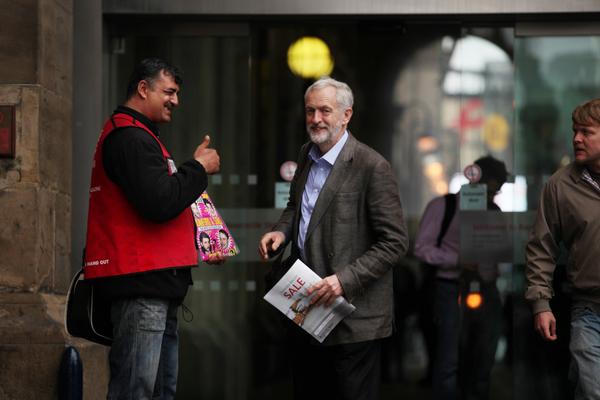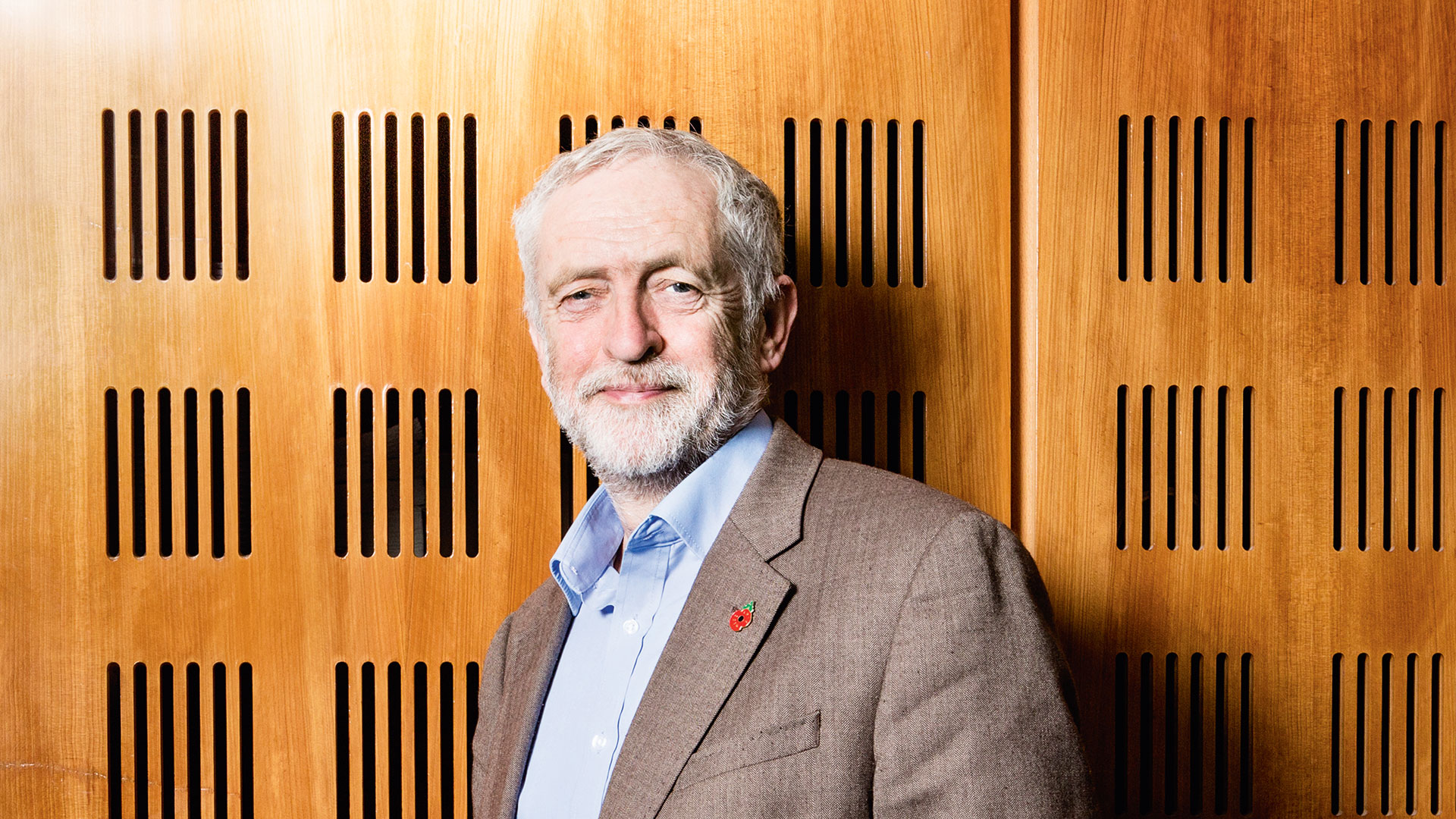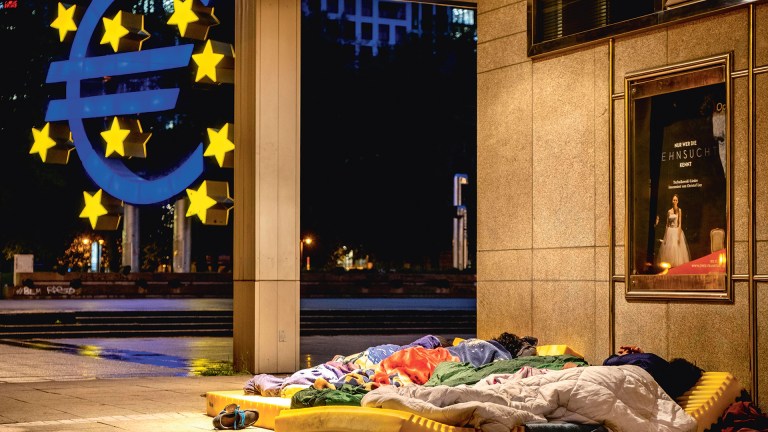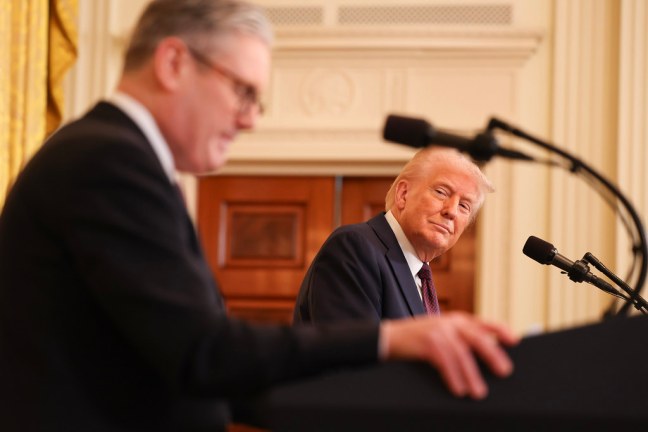After he has evaded the ITN cameras and bid farewell to his wood-club pals, I join him in a TUC side-office to delve a bit deeper.
Sam Delaney: Hello Jeremy. This is a busy way to spend a Saturday morning. Do you get any time off in your job?
Jeremy Corbyn: The Sun sent a photographer to trail me to my allotment on a Sunday morning. They took pictures of me and my wife collecting tomatoes then ran a story saying I wasn’t taking my role seriously. It was my wife’s birthday
That’s not a very romantic thing to do on your wife’s birthday.
Well, we went out for a lovely dinner that night too.
What did you think of newspapers’ reaction to the High Court ruling over Article 50?
Advertising helps fund Big Issue’s mission to end poverty
I’m really shocked. To have a paper that puts on the front page that judges are the enemy of the people, that’s got really nasty connotations. I’ve spent all my life on campaigns, and courts are often taking decisions that I don’t agree with – and judges have said things I don’t agree with. That’s life. But I respect them to do it, [respect them] for it. And surely our newspapers ought to respect the separation of political and judiciary powers. To start calling people enemies of the people is nasty, dangerous language and plays into all kinds of horrible directions
Does it really matter what the papers say any more? I get the impression you don’t think speaking with them is important.
It matters in that it often frames debate. Numbers of people that buy and read newspapers are declining but the number that follow news online is huge. I do a straw poll at meetings, asking ‘how many people buy a newspaper?’. With an older audience you get usually about a third to half buy a newspaper once a week, often the local paper. When you go to a younger audience, it’s almost none. One audience I spoke to, nobody did. They read it online though.
In light of that High Court ruling, do you think an early election could be likely – and are you ready for it?
Absolutely ready for it. Our members are ready for it. I don’t think the Prime Minister’s decided yet because she has got herself in a mess by not setting out the basic terms of the exit negotiations, she just keeps saying ‘Brexit means Brexit’. There’s got to be more analysis than that, and so we’re setting out our views about a trade arrangement, trade access with Europe, as well as protection of workers’, environmental and consumer rights.
Advertising helps fund Big Issue’s mission to end poverty
Do you think there is any chance that parliament might attempt to block Brexit altogether?
It would be wrong to override the result of the referendum. The referendum was held and the decision was made. It wasn’t the one I wanted but I accept the result and we’ll do our best to negotiate the best deal we can.
Our campaign is for funding of the NHS, and recognition of the costs to the NHS of underfunding of social care
If there was a general election tomorrow, could you win it?
We are setting out an agenda which I think appeals to a lot of people, we’re mounting a huge campaign defending the National Health Service. We have a clear strategy on housing, building half a million council homes during the lifetime of the Labour government. Also, regulation of the private rented sector. I want a national education service that gives genuine access to nursery places for all children and brings back the education maintenance allowance
You’re extremely strong within the party but how could you win over the country if there was an election within the next six months?
An economic agenda which challenges austerity and invests. A national investment bank would provide the infrastructure investment necessary, regionally based because there’s grotesque inequalities both within our society and within the regions. A real living wage would be a very big help. And a social strategy about health, education and the way in which we as a society treat people.
Advertising helps fund Big Issue’s mission to end poverty
As long as you’re not in power, how can you influence these things?
In opposition you can achieve things. They tried to cut working tax credits. We defeated them, and three million families have a thousand pounds more than they would have had. They tried to force every school to become an academy in England. We defeated them. They tried to take away personal independence payments for those with disabilities. They retreated. You can win things but you can also frame the agenda. We’ve actually changed the debate.
Have you really changed the debate? Or is Theresa May just talking about social mobility because she senses she can steal a generation of disillusioned Labour voters?
I’m sure the preparation for that speech was utterly cynical, in the way Tories try to adopt the language of the left. Margaret Thatcher did the same thing in the 1980s. Quite simply, we are the party committed to the universal welfare state and the National Health Service. They are a party committed to continuing appalling levels of inequality in Britain, lowering the top rate of taxation and lowering corporation tax. There’s a big difference.
Tell me about your plans to solve the housing crisis.
Not enough houses are being built. Many councils want to build but when they get a site have to balance it against the demands of the private sector. I want to give local authorities power to borrow and, if they wished to, build 100 per cent of council housing on a site. We would use a national investment bank to support housing. We need better regulation of the private rented sector, longer-term tenancies. I supported the [Homelessness Reduction] Bill, promoted by Crisis. It gives a power to local authorities – but doesn’t give them the resources to do it. That is better than not giving them the power, though obviously resources are crucial. Unless we deal with emergency accommodation and move-on accommodation for rough sleepers or sofa-surfing homeless, we’re not actually solving the problem. There has to be an investment in social housing, council housing, and a requirement, as in Wales, that local authorities deal with street homelessness. I like the Welsh model. It’s interesting.
Advertising helps fund Big Issue’s mission to end poverty
The whole point is to engage the wider electorate with the enthusiasm we’ve got around our party and supporters
The NHS is in crisis but we don’t hear Labour saying that much about it. Why?
We’re doing a big campaign for funding the NHS. We are saying a great deal about it. We aren’t perhaps getting as much media coverage as we deserve but that’s often a problem. The NHS transformation reports are going to come out in November and deficit levels in all NHS districts are massive: £700m in Birmingham over the next four years, and plenty others. Our campaign is for funding of the NHS, and recognition of the costs to the NHS of underfunding of social care. Many people in need of care when they come out of hospital remain in hospital longer than necessary because of it. Because of the shortage of GPs, A&E departments are taken over by people who just are desperate. There is an A&E crisis. Our worry is [government] transformation plans in November will predict NHS A&E departments closing. We actually need more.
You mention you don’t always get the media coverage you’d like. How about a gimmick? Tony Blair had his Pledge Card. Ed Miliband had his Ed Stone. Shouldn’t you be spelling out your policy ideas in a friendlier way?
Put them on a T-shirt or something you mean? They certainly won’t be on a stone. I’m more of a woodwork man myself.
Perhaps you could chisel them.
Chisel them on wood maybe. I could do that myself, couldn’t I?
Advertising helps fund Big Issue’s mission to end poverty
You don’t like spin but don’t things like that help to communicate more effectively to the public sometimes?
Where does political power come from? It actually comes, ultimately, from preparing people to accept or reject – activate themselves to do something different.
You have a very passionate army of young, engaged supporters already. But the majority of the electorate aren’t politically engaged. How are you going to get them engaged?
The whole point is to engage the wider electorate with the enthusiasm we’ve got around our party and supporters. We’ve got 600,000 members, biggest ever. They want to see an alternative, a different economic strategy. They don’t want to see a society where we walk by on the other side and tolerate homelessness
Did you make jam for the Queen? We heard you did but that Cameron forgot to get her a present so you were banned from giving her the jam.
[Turning to adviser] What am I allowed to say on this? I have made jam and I have offered it to many people… and they have all enjoyed it.
Advertising helps fund Big Issue’s mission to end poverty
So you will not confirm or deny that you gave the Queen some jam?
There are many who’ve enjoyed my jam and still do. I get very good feedback.
What about Strictly Come Dancing? Have you voted for Ed Balls?
No, I haven’t voted in Strictly Come Dancing but I wish him well.
Do you watch it?
A bit of it, yeah, but I’m not going on it. No way.
Advertising helps fund Big Issue’s mission to end poverty
What about John McDonnell? Who’d be more successful on the dance floor out of the pair of you?
John. He looks to be like a bit of a mover on the dance floor. I do my running and exercise. I go running every week. Usually Finsbury Park.
Your job is remarkably stressful. How do you deal with it?
I don’t get stressed.
You don’t get stressed?
I don’t get stressed, no.
Advertising helps fund Big Issue’s mission to end poverty
I just don’t believe you because people are hassling you and criticising you and shouting at you and all of that sort of stuff.
I feel sorry for them.
For the people who hound you?
Yes. Because they are under pressure to hound me and they hang around outside my house hounding me, and some of them are a bit pushy, s’alright.
Jeremy Corbyn photographed for The Big Issue by Louise Haywood-Schiefer in London on November 5











